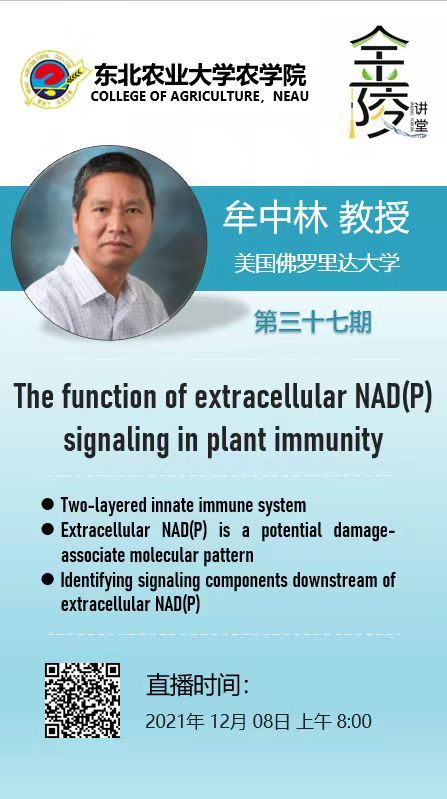报告题目:细胞外NAD(P)信号传导在植物免疫中的作用
报告人:牟中林 教授(美国佛罗里达大学)
报告时间:12月8日(星期三)上午08:00
直播平台:百博智慧直播间金陵讲堂频道
红足1世足球网址大全
2021年12月06日

报告人介绍:
牟中林,博士,1999年在中国科学院遗传研究所取得博士学位后,于2000年至2004年在美国杜克大学进行博士后研究工作,现为美国佛罗里达大学微生物学和细胞科学系教授,目前主要从事植物免疫中的信号转导途径方面的研究。牟中林博士在《Science》(1篇)、《Cell》(2篇)、《Plant Cell》(5篇)等具有国际影响力的顶尖学术期刊发表多篇论文。
报告摘要:
All eukaryotes possess a sophisticated immune system to defend against microbial pathogens. Whereas animals employ both innate and adaptive immunities, plants lack adaptive immunity and strictly rely on innate immunity. Every plant cell is capable of using the so-called two-layered innate immune system to detect potential microbial pathogens and mount immune responses. We recently found in the model plant Arabidopsis thaliana that, upon wounding and bacterial infection, nicotinamide adenine dinucleotide (NAD) and NAD phosphate (NADP) are released into the extracellular milieu at concentrations sufficient for immune activation, suggesting that extracellular NAD(P) is a potential damage-associate molecular pattern in plants. To dissect the immune signaling pathway activated by extracellular NAD(P) in plants, we employed both forward and reverse genetic approaches to identify signaling components downstream of extracellular NAD(P). Several signaling components including two NAD(P) receptors have so far been identified. Characterization of these signaling components revealed a significant role for extracellular NAD(P) in plant immunity including basal immunity and systemic acquired resistance. In this seminar, we will discuss our findings in the context of the plant immune system and will compare the mechanisms utilized by plants and animals to process and/or perceive extracellular NAD(P).
